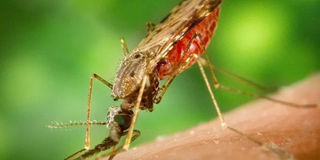We don’t have to lose so many people to malaria

A mosquito. PHOTO/FILE
What you need to know:
- The issue: Fight against malaria.
- Our view: Preventing malaria deaths can sometimes be as simple as destroying stagnant water near homes, indoor residual spray, and getting treatment early for those who are infected.
This week, the weatherman warned Ugandans to brace themselves for more rainfall activity. In a series of tweets on Wednesday, Uganda National Meteorological Authority said more rainfall is expected in eastern, West Nile, Acholi, Lango and Karamoja sub-regions, according to their August seasonal outlook.
They warned disaster-prone areas to be on alert, and urged farmers across the country to prepare gardens in readiness for the October-December season.
But with Uganda’s rain season also come disasters such as that witnessed last weekend around the Mt Elgon region where flash floods killed about 30 people, with more still considered missing.
It was in the spirit of warning people about the downsides of the rain season that the Ministry of Health warned of Malaria and cholera outbreaks that usually increase with the coming of the rains.
According to a story by this newspaper yesterday, the Health ministry is bracing itself for the worst.
The rains increase breeding grounds for mosquitoes, raising vulnerability to insect bites and the spread of malaria.
An average of 37,600 cases are being registered in the country per day, resulting in increased hospitalisation and deaths. Malaria kills 16 Ugandans daily and causes an estimated annual economic loss of $658m (Shs2.4 trillion) due to treatment costs and work time lost, according to statistics from the Health ministry and a report by the World Health Organisation (WHO).
According to the latest World malaria report, there were 241 million cases of malaria globally in 2020 compared to 227 million cases in 2019. The estimated number of malaria deaths stood at 627,000 in 2020 – an increase of 69,000 deaths over the previous year.
In Uganda, Health experts have attributed the upsurge to the resistance of malaria parasites and mosquitoes to drugs and pesticides, respectively. This means people undergo treatment for malaria, but do not heal. This is worrying.
But as the adage goes, prevention is better than cure. As the rains continue pouring, we are likely to see an increase in cases of malaria. It is our appeal that the various stakeholders play their part in making sure we register fewer cases, and even deaths of malaria.
Government has sometimes carried out mass distribution of free treated mosquito nets. We appeal to the authorities that money be found to make them available, especially to expectant mothers and children.
To members of the public, preventing malaria deaths can sometimes be as simple as destroying stagnant water near homes, indoor residual spray, and getting treatment early for those who are infected. Losing 16 people a day is a number too high to a disease that can be prevented and treated.




